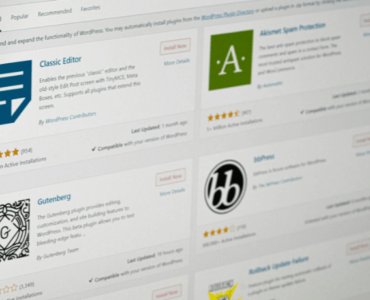A domain email address boosts credibility, strengthens branding, and ensures professional communication, unlike free email services. It offers better security, control, and organization, allowing businesses to create role-based emails and protect...
How to Host a Website
Register a domain name that is short, relevant, and easy to remember through trusted providers. Choose a web hosting service that suits your needs, link it to your domain, and install a CMS like WordPress for easy content management. Finalize and...
Boosting Your Website’s SEO with Fast and Reliable Hosting
A quality hosting provider ensures faster page load speeds, high uptime, and strong security, all of which help improve search engine rankings. Choosing a hosting provider with servers near your target audience and supporting mobile optimization can...
Exploring One-Click App Installs: Streamlining Your Website Setup
One-click app installs simplify website setup by automating installation and configuration, allowing users to deploy applications quickly and without technical expertise. Security and updates are essential, as pre-configured applications may require...
Why Are Daily Backups and Disaster Recovery Critical for Your Website
Daily backups prevent data loss by ensuring a recent copy of website data is always available in case of cyberattacks, technical failures, or accidental deletions. Disaster recovery minimizes downtime by allowing businesses to quickly restore their...
Why SSL Certificates Are Essential for Website Security and Customer Trust
SSL certificates encrypt sensitive data transmitted between a website and its users, protecting user information from hackers and cyber threats. A secure website builds customer trust, improves search engine rankings, and provides compliance with...
Key Considerations When Scaling from Shared to VPS Hosting
Upgrading from shared to VPS hosting improves website performance, security, and scalability, making it essential for growing websites. Assessing resource needs, choosing between managed and unmanaged VPS, and providing strong security measures are...
Maximizing 24/7 Customer Support for Smooth Hosting
Contact support for website downtime, slow performance, security concerns, or technical issues. Use the provider’s knowledge base for non-urgent matters. Provide detailed information about the issue, including error messages and recent changes. Use...
The Role of Elastic Infrastructure in VPS Hosting and Scalability
Elastic infrastructure in VPS hosting allows businesses to dynamically scale resources based on demand, providing optimal performance and cost-efficiency. Automatic scaling (auto-scaling) adjusts resources in real time, handling traffic spikes and...
A Beginner’s Guide to Understanding VPS Hosting and When to Use It
VPS hosting provides a private virtual environment on a shared physical server, offering dedicated resources and improved performance compared to shared hosting. Ideal for websites with growing traffic, resource-intensive applications, or businesses...
Top Benefits of Hosting Your Website with SSD High-Speed Disks
SSD hosting provides near-instant website loading times, seamless handling of high traffic, and better SEO performance. With no moving parts, solid-state drives offer improved durability, reduced risk of data loss, and advanced protection measures...
How to Conduct a Website Audit: Steps and Tools
A website audit is a comprehensive evaluation of your site’s performance, examining key factors like speed, mobile responsiveness, SEO, content quality, and security to create a strategic roadmap for improvements. Tools like Google Analytics...
How to Migrate Your Website to a New Host Without Downtime
Choose a reliable hosting provider, back up all files and databases, and set up the new server to match your existing configuration. Transfer files and databases, update DNS records, and test your website on the new host before finalizing the switch...
The Pros and Cons of Different CMS Platforms: WordPress vs. Others
WordPress is ideal for small to medium-sized websites, while Drupal excels in handling complex, high-traffic sites, and Magento is best for large-scale e-commerce businesses with advanced needs. WordPress is more user-friendly, Drupal provides deep...
6 Green SEO Practices to Improve Your Website’s Sustainability
Improving website speed, simplifying structure, and reducing unnecessary elements helps reduce energy consumption and enhance the user experience. Focusing on high-quality, long-lasting content reduces the need for frequent updates, saving both...
Spotlight: Klaus Stelzig, Founder, Lignum Design
I am Klaus, the founder of Lignum Design Ltd. I also work as a designer on residential Timberframe buildings and commercial Mass Timber structures. With 31 years of experience in the timber industry, I am passionate about providing suitable details...
Cloud Hosting vs. Dedicated Servers: Which is Right for You?
Cloud hosting offers scalability, reliability, and cost-efficiency through a network of virtual servers, making it ideal for businesses with fluctuating traffic and flexible budgets. Dedicated servers provide exclusive access to hardware resources...
The Importance of DDoS Protection for WordPress Websites
DDoS attacks flood a server’s resources to disrupt site availability, blocking legitimate users from accessing your services. WordPress sites are common targets due to their popularity and open-source structure, especially when plugins and...





